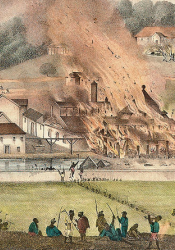Jamaican Slave Rebellion of 1831
An uprising and rebellion of slaves in Jamaica would go on to affect the emancipation of hundreds of thousands of slaves in Great Britain, as well as its colonies.
This powerful uprising had small beginnings. The slaves in Jamaica were notoriously some of the most poorly treated slaves across the British Empire- facing heavy abuse and very little power or freedom, even for slaves. Most of them were illiterate and knew very little of life outside the plantation. Despite all of these obstacles against them, word slowly went around through an enslaved Baptist Preacher, Samuel Sharpe, about the hope of freedom. Sharpe, who had both experience and could read, educated his fellow slaves on two key ideas. The first being that through the Bible they were promised “freedom in Christ,” freedom was a God-given right for all men, not just white men. The second important piece of information they gained was that the majority of England was against the Slave trade and were calling for emancipation. These ideas would carry them through the rebellion.
On Christmas Day of 1831, a peaceful protest began. The slaves refused to work unless they were given working wages and free time. The plantation owners refused these demands, as a result, the spark of rebellion was lit. Starting with a fire at Kensington Estate that carried through across neighboring plantations, Jamaica was up in flames with the uprising on December 27, 1831, that carried through into January of 1832. Two more months of sporadic uprisings caused British troops to come to gain order again. As a result, hundreds of slaves and free black people would be executed, including Samuel Sharpe.
Their fighting would not be in vain. To those across the sea already against slavery, this uprising gave them purpose and a clear fight. For those on the fence about the issue, the idea of England having to constantly be at war to stabilize such uprisings would push them to fight for emancipation as well. Eighteen months after the first fires of the rebellion in Jamaica, William IV would sign a bill for full emancipation throughout all of Great Britain’s colonies- including Jamaica and the West Indies in 1838.
Wonderful Adventures of Mrs. Seacole in Many Lands takes place in Jamaica, the birthplace of Mrs. Seacole, as well as the British colonies. The Jamaican Rebellion, and the resulting emancipation of slaves, largely influence this piece and the life of Mrs. Seacole, regardless of the event never being directly addressed.
Work Cited
Duperly, Adolphe, The Destruction of Roehampton Estate. 1832
Momodu, Samuel. “The Baptist WAR (1831-1832) •.” •, 17 Sept. 2019, https://www.blackpast.org/global-african-history/baptist-war-1831-1832/.
Zoellner | May 28, Tom. “The Uprising of 60,000 Jamaicans That Changed the Very Nature of Revolt.” Zócalo Public Square, 11 July 2020, https://www.zocalopublicsquare.org/2020/05/28/jamaican-uprising-samuel-s...

